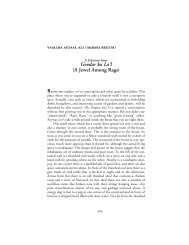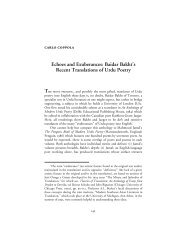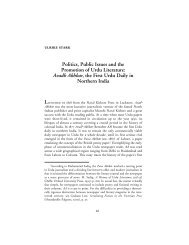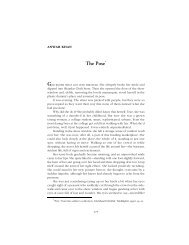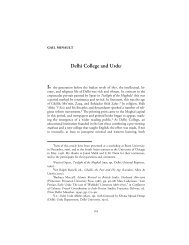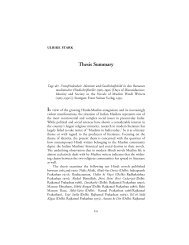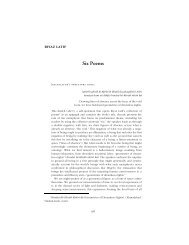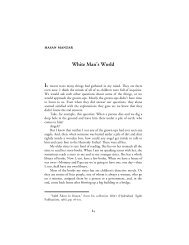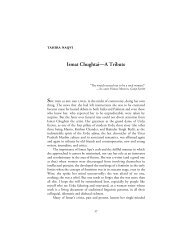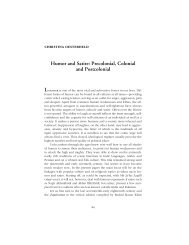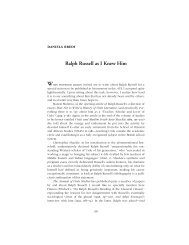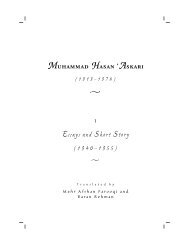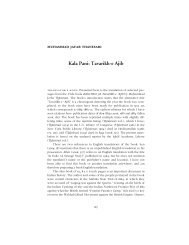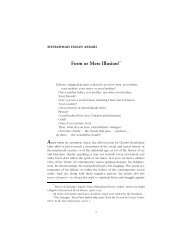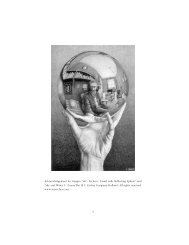Premchand's âShatranj ke Khilariâ in Translation - the Annual of Urdu ...
Premchand's âShatranj ke Khilariâ in Translation - the Annual of Urdu ...
Premchand's âShatranj ke Khilariâ in Translation - the Annual of Urdu ...
Create successful ePaper yourself
Turn your PDF publications into a flip-book with our unique Google optimized e-Paper software.
212 • The <strong>Annual</strong> <strong>of</strong> <strong>Urdu</strong> Studies, No. 28<br />
<strong>the</strong> k<strong>in</strong>gdom through <strong>the</strong> evil <strong>of</strong> debt) (ibid., 91). Pritchett notes that Premchand<br />
<strong>of</strong>fers one redemptive statement <strong>in</strong> favor <strong>of</strong> Awadh <strong>in</strong> <strong>the</strong> <strong>Urdu</strong> story,<br />
though no such observation is made <strong>in</strong> <strong>the</strong> H<strong>in</strong>di text. As regards <strong>the</strong> Company,<br />
he observes: ìvuhī mahājanī čāl čalī jis sē āj sārī kamzōr qaumēñ<br />
pa-ba-zangīr hō rahī haiñî (2010, 91); (ì[The company] played <strong>the</strong> same<br />
moneylenderís trick due to which all weak nations are be<strong>in</strong>g subjugatedî)<br />
(Pritchett 1986, 77). The outwardly peaceful annexation <strong>of</strong> Awadh is a reality<br />
which ushered <strong>in</strong> <strong>the</strong> cataclysmic transformation <strong>in</strong> Indiaís colonial history<br />
and is supposed to have had serious ramifications <strong>in</strong> catalyz<strong>in</strong>g <strong>the</strong> Upris<strong>in</strong>g<br />
<strong>of</strong> 1857 (Misra 2006, 109–14). The fact that <strong>the</strong> people <strong>of</strong> Awadh did not<br />
accept <strong>the</strong> annexation as a fait accompli is corroborated by <strong>the</strong> outbreak<br />
<strong>of</strong> <strong>the</strong> upris<strong>in</strong>g <strong>in</strong> Meerut. They were also deeply moved by <strong>the</strong> dethron<strong>in</strong>g<br />
<strong>of</strong> <strong>the</strong> Navāb (Mukherjee 1984, 35–36; Misra 2006, 110–11).<br />
Both <strong>of</strong> Premchandís stories conclude on a bloody note. Mīr and Mirzā<br />
draw swords and wound each o<strong>the</strong>r fatally. The k<strong>in</strong>gdom falls <strong>in</strong> a bloodless<br />
coup with <strong>the</strong> k<strong>in</strong>g, seem<strong>in</strong>gly, an accomplice, but m<strong>in</strong>or issues, such<br />
as aspersions cast on each o<strong>the</strong>rís l<strong>in</strong>eage and frustrations due to deceitful<br />
moves <strong>in</strong> <strong>the</strong> game <strong>of</strong> chess, lead <strong>the</strong> chess players to confront and kill each<br />
o<strong>the</strong>r. The irony is unmistakable. This k<strong>in</strong>d <strong>of</strong> deus ex mach<strong>in</strong>a dénouement<br />
seems implausible, <strong>ke</strong>ep<strong>in</strong>g <strong>in</strong> m<strong>in</strong>d <strong>the</strong> <strong>in</strong>dolence that characterizes Premchandís<br />
protagonists and <strong>the</strong> laid-back attitude <strong>of</strong> <strong>the</strong> people <strong>of</strong> Lucknow.<br />
Premchandís justification <strong>of</strong> <strong>the</strong> sudden rush <strong>of</strong> blood is realistically unconv<strong>in</strong>c<strong>in</strong>g<br />
for a people given over to leisurely lifestyles. The story could<br />
have concluded with <strong>the</strong> narratorís condemnation <strong>of</strong> <strong>the</strong> <strong>in</strong>difference and<br />
apathy <strong>of</strong> Mīr and Mirzā regard<strong>in</strong>g <strong>the</strong>ir own fate, <strong>the</strong> fate <strong>of</strong> <strong>the</strong>ir k<strong>in</strong>g and<br />
<strong>of</strong> <strong>the</strong>ir k<strong>in</strong>gdom. This would have perhaps brought home <strong>the</strong> po<strong>in</strong>t more<br />
tell<strong>in</strong>gly.<br />
The acme <strong>of</strong> Lucknowís cultural and l<strong>in</strong>guistic etiquette provided<br />
strongly for <strong>the</strong> possibility that anyone who was city-bred, or had spent<br />
some time <strong>in</strong> <strong>the</strong> city, whe<strong>the</strong>r rich or poor, educated or uneducated, literate<br />
or illiterate, feudal or pr<strong>of</strong>essional, spo<strong>ke</strong> <strong>the</strong> urban language with<br />
unmatched grace and eloquence, even border<strong>in</strong>g on artifice. Premchandís<br />
<strong>Urdu</strong> text <strong>in</strong>dicates this but his H<strong>in</strong>di textís expression, especially his narratorís<br />
Sanskritic usage and irony, is at odds with <strong>the</strong> protagonists cultural<br />
and l<strong>in</strong>guistic lean<strong>in</strong>gs. q



